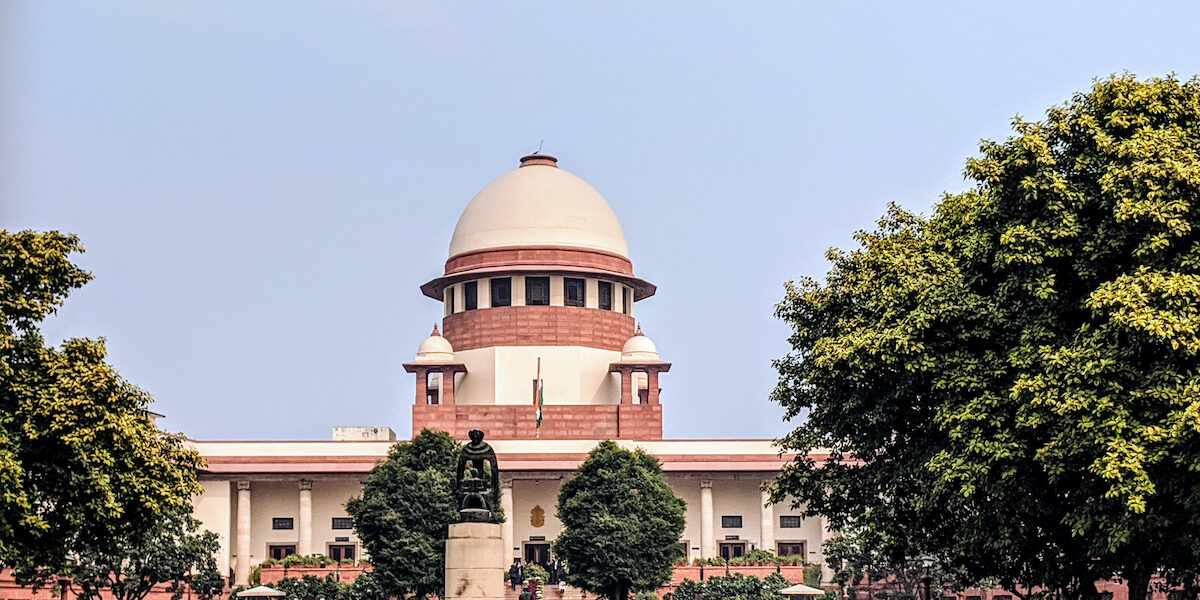The Bench held that Tamil Nadu’s objections are 'premature', stating, Karnataka is not constructing the dam now; it is only seeking to prepare a DPR.'
Published Nov 13, 2025 | 3:00 PM ⚊ Updated Nov 13, 2025 | 3:51 PM

The Supreme Court of India. (iStock)
Synopsis: Tamil Nadu argued that the Mekedatu dam proposal is in direct violation of the final Supreme Court judgment on the Cauvery water dispute, and that constructing the dam would severely affect the state’s water supply.
The Supreme Court on Wednesday, 13 November, heard Karnataka’s plea seeking permission to prepare a Detailed Project Report (DPR) for the Mekedatu reservoir project.
The matter was heard before the Chief Justice’s Bench, with Tamil Nadu represented by senior advocate Mukul Rohatgi.
According to Livelaw, a bench comprising Chief Justice of India BR Gavai, Justice K Vinod Chandran and Justice NV Anjaria observed that Tamil Nadu’s challenge to the order passed by the Central Water Commission (CWC) for the preparation of the Detailed Project Report (DPR) for the Mekadatu dam was “premature”, as the plan would be approved only after considering the objections of the State as well as the opinion of the expert bodies, Cauvery Water Regulation Committee (CWRC) and the Cauvery Water Management Authority (CWMA).
Tamil Nadu argued that the Mekedatu dam proposal is in direct violation of the final Supreme Court judgment on the Cauvery water dispute, and that constructing the dam would severely affect the state’s water supply.
Rohatgi submitted, “The Mekedatu project violates the court’s final judgment. If the dam is built, Tamil Nadu will be seriously affected and the flow of water due to the state will be obstructed.”
The Central Water Commission (CWC) had earlier stated that, they cannot approve the project or permit preparation of a DPR, and that any decision must be taken only by the Cauvery Water Disputes Tribunal / Management Authority.
Tamil Nadu noted that they have been compelled to repeatedly approach the Supreme Court because Karnataka has, on multiple occasions, failed to release the water mandated by the apex court.
Tamil Nadu further argued that water from Kabini and Krishnaraja Sagar (KRS) will be blocked by the new dam, particularly 80 TMC, which would hit lakhs of farmers.
They added, “Karnataka already has enough dams across the Cauvery; another dam is unnecessary. Preparing the DPR is the first step to constructing the dam, and therefore must be stopped at the outset.”
Responding to the arguments, the Bench asked Tamil Nadu the following questions:
Tamil Nadu responded that only the Supreme Court can take a final call, and approaching the Centre is not acceptable since Karnataka has repeatedly violated earlier orders.
Meanwhile, Puducherry also opposed permission to prepare the DPR, and Kerala recorded its objection to the Mekedatu dam proposal.
The Bench held that Tamil Nadu’s objections are “premature”, stating, “Karnataka is not constructing the dam now; it is only seeking to prepare a DPR. Tamil Nadu’s concerns can be addressed when the DPR is submitted to the Centre.”
The order further read, “Once the DPR is prepared and submitted to the Central Water Commission, it must seek the views of Tamil Nadu, the Cauvery Water Management Authority, and the Cauvery Water Regulation Committee before any final decision. All riparian states must strictly follow the orders of the Cauvery Water Management Authority.”
“Karnataka must comply fully with release schedules ordered by the Authority. Failure by any state to follow Supreme Court’s orders will amount to contempt of court. If Karnataka does not release the water due to Tamil Nadu at Biligundlu, it will be considered contempt. All pending petitions related to the Mekedatu dam have now been disposed of.”
Senior advocate Umadevan, appearing for Tamil Nadu, expressed concern, “Allowing preparation of the DPR may reopen decades of Cauvery water disputes. After fighting legally for over 50 years, the issue risks going back to the starting point.”
Meanwhile, Karnataka asserted that, “Tamil Nadu always exaggerates the situation. Water disputes cannot be ‘permanently resolved’ but only managed based on agreements.”
They cited the example of Colorado River disputes in the U.S., ongoing for over 130 years.
Karnataka Deputy Chief Minister DK Shivakumar called it a victory for the people of Bengaluru.
“Tamil Nadu will get its share of water as per Court’s judgements and hence we will continue with the project. This project is being done in our land and with our resources. This project will help us supply water to Tamil Nadu as per the tribunal’s order even during poor rain years. This is a victory to the people of Bengaluru,” he said, while speaking to reporters at Vidhana Soudha on Thursday.
He further said that this water will be provided as drinking water to people from all states living in Bengaluru. ”I appeal to Tamil Nadu to support the project now at least. We all need to work on this project together,” he said.
Responding to a question on whether the judgement was a setback for Tamil Nadu, Shivakumar said, “This is not about setback or victory. It has given justice on Mekedatu. Mekedatu is a project for our water and it doesn’t affect Tamil Nadu in any way. In fact it benefits Tamil Nadu. The Supreme Court has responded to the people of Karnataka.”
(Edited by Sumavarsha, with inputs from Subash Chandra Bose)
